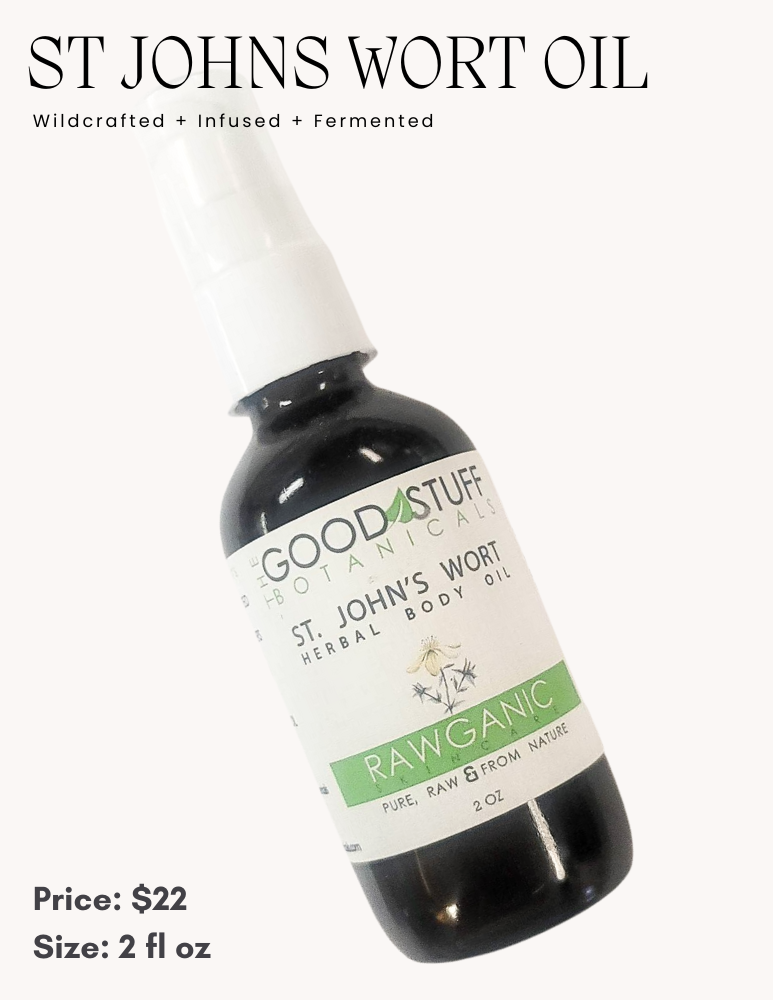As the sun dips low and winter's chill sets in, many of us crave a natural mood boost. Enter St. John's Wort, a golden-flowered herb with a history as vibrant as its blooms. Beyond its potential to combat the winter blues, it boasts a rich tapestry of folklore and a surprising range of topical benefits.
The Science: St. John’s Wort (Hypericum perforatum) is well-regarded for its topical applications, particularly in addressing inflammation and nerve damage. The plant’s primary active compounds, hypericin and hyperforin, play crucial roles in these therapeutic effects. Hypericin has been shown to possess significant anti-inflammatory properties by inhibiting the production of pro-inflammatory cytokines, such as interleukin-6 and cyclooxygenase-2. These cytokines are key players in the inflammatory response, and their inhibition helps reduce inflammation and associated pain.
Hyperforin, another major compound in St. John’s Wort, is known for its neuroprotective and nerve restorative properties. It has been found to modulate neurotransmitter levels, including serotonin, norepinephrine, and dopamine, which are essential for nerve function and pain regulation. Additionally, hyperforin activates transient receptor potential (TRP) channels, which play a role in cellular processes linked to neuroprotection and pain relief. This makes St. John’s Wort particularly effective in treating conditions such as sciatica, neuropathy, and other forms of nerve damage.
The plant’s flavonoids and tannins also contribute to its anti-inflammatory and antioxidant effects. These compounds help stabilize cell membranes and protect nerve cells from oxidative stress, which can exacerbate inflammation and nerve damage. By reducing oxidative stress and inflammation, St. John’s Wort supports the healing and regeneration of damaged nerves, promoting overall nerve health.
Moreover, St. John’s Wort has been shown to influence the activity of voltage-dependent calcium channels and mitogen-activated protein kinases (MAPKs), which are involved in pain signaling and nerve function. By modulating these pathways, St. John’s Wort can help alleviate nerve pain and improve nerve function.
Myth and Magic: Steeped in legend, St. John's Wort has been woven into cultures for centuries. Ancient Greeks called it "Hyperikon," believing it held the power to ward off evil spirits and promote healing. Its name in various languages references John the Baptist, with its peak bloom aligning with his feast day. In Germanic folklore, it was said to ward off witches and protect against lightning strikes.
Harnessing the Sun's Power: Modern science delves deeper, revealing compounds like hypericin and flavonoids. These are believed to support the production of mood-regulating neurotransmitters, potentially offering relief from mild to moderate depression, especially during winter's diminished sunlight. But the benefits extend further:
- Skin Soother: Packed with omega-3 and omega-6 fatty acids, St. John's Wort oil acts as a natural moisturizer, particularly beneficial for dry winter skin.
- Relaxation Remedy: Its calming properties shine through in massage oils, promoting relaxation and potentially improving sleep quality.
- Antioxidant Powerhouse: Studies indicate potential antioxidant benefits, protecting cells from damage.
- Nerve Pain: Topical St. John’s Wort oil is known for its ability to soothe nerve pain. It’s often used to help with conditions like neuropathy and sciatica by promoting nerve repair and reducing discomfort.
- Minor Burns: St. John’s Wort oil is highly effective for treating minor burns. It helps alleviate pain and promotes faster healing.
- Muscle Pain: This oil is great for relieving muscle strain and tension. It’s often used in massage therapy to ease muscle discomfort and improve mobility.
- Growing Pains: For children experiencing growing pains, St. John’s Wort oil can provide significant relief, helping them sleep better.
- Cuts, Scrapes, and Scratches: The oil aids in the regeneration and healing of the skin, making it useful for treating minor cuts and scrapes. It’s best applied when the area can be kept clean to avoid attracting dirt.
- Scars: Regular application of St. John’s Wort oil can help reduce the appearance of scars from cuts and wounds.
- Inflammation: May help reduce swelling that accompanies sprained joints from an injury.
Where Does the Sunshine Grow?
St. John's Wort thrives in sunny meadows and fields throughout Europe, North America, and Asia. While readily available commercially, the wildcrafting spirit can lead you to discover it yourself. Important note: Before wildcrafting, ensure proper identification and knowledge of sustainable harvesting practices. Consult a qualified herbalist or wildcrafting guide for safe and responsible collection.
Embrace the Wisdom of Nature:
The Good Stuff Botanicals believes in harnessing nature's bounty for well-being. St. John's Wort, with its rich history, mood-boosting potential, and diverse benefits, embodies this philosophy. Explore our offerings and discover how this sun-kissed herb can support your journey towards holistic wellness.

Disclaimer: This information is for educational purposes only and should not be interpreted as medical advice. Always consult a healthcare professional before using any new products or supplements.
Remember:
- Consult your doctor: Before using St. John's Wort, especially if you take medications or have underlying health conditions.
- Quality Matters: Choose organic, high-quality products from reputable sources.
- Patch Test: Always do a patch test on a small area of skin before applying it more widely.
- Be Patient: Like most natural remedies, the effects of St. John's Wort may take time to manifest.

